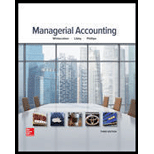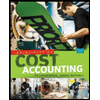
Managerial Accounting
3rd Edition
ISBN: 9780077826482
Author: Stacey M Whitecotton Associate Professor, Robert Libby, Fred Phillips Associate Professor
Publisher: McGraw-Hill Education
expand_more
expand_more
format_list_bulleted
Concept explainers
Question
Chapter 2, Problem 8.1GAP
To determine
Concept introduction:
Predetermined rate of
To calculate:
The predetermined rate of overhead.
Expert Solution & Answer
Want to see the full answer?
Check out a sample textbook solution
Students have asked these similar questions
Tt gucuguvcucuucc
What is the full cost per unit of making and selling the product
I am searching for the correct answer to this general accounting problem with proper accounting rules.
Chapter 2 Solutions
Managerial Accounting
Ch. 2 - What is the difference between job order and...Ch. 2 - What types of companies are likely to use job...Ch. 2 - What types companies are likely to use process...Ch. 2 - Many service industries use job order costing to...Ch. 2 - Prob. 5QCh. 2 - Prob. 6QCh. 2 - Prob. 7QCh. 2 - Prob. 8QCh. 2 - Prob. 9QCh. 2 - Prob. 10Q
Ch. 2 - Prob. 11QCh. 2 - Prob. 12QCh. 2 - Prob. 13QCh. 2 - Prob. 14QCh. 2 - Prob. 15QCh. 2 - Prob. 16QCh. 2 - Prob. 17QCh. 2 - Prob. 18QCh. 2 - Prob. 19QCh. 2 - Prob. 20QCh. 2 - Prob. 21QCh. 2 - Prob. 1MCCh. 2 - Prob. 2MCCh. 2 - Prob. 3MCCh. 2 - Prob. 4MCCh. 2 - Prob. 5MCCh. 2 - Prob. 6MCCh. 2 - Prob. 7MCCh. 2 - Applied overhead costs are recorded a. On the left...Ch. 2 - Prob. 9MCCh. 2 - Prob. 10MCCh. 2 - Identifying Companies That Use Job Order versus...Ch. 2 - Prob. 2MECh. 2 - Prob. 3MECh. 2 - Prob. 4MECh. 2 - Prob. 5MECh. 2 - Prob. 6MECh. 2 - Prob. 7MECh. 2 - Prob. 8MECh. 2 - Prob. 9MECh. 2 - Prob. 10MECh. 2 - Prob. 11MECh. 2 - Calculating Over- or Underapplied Overhead Costs...Ch. 2 - Prob. 13MECh. 2 - Prob. 14MECh. 2 - Prob. 15MECh. 2 - Calculating Direct Materials Used in Production...Ch. 2 - Calculating Missing Amounts and Cost or Goods...Ch. 2 - Prob. 19MECh. 2 - Prob. 1ECh. 2 - Preparing Journal Entries Refer to the information...Ch. 2 - Prob. 3ECh. 2 - Preparing Journal Entries Refer to the information...Ch. 2 - Prob. 5ECh. 2 - Finding Unknown Values in the Cost of Goods...Ch. 2 - Prob. 7ECh. 2 - Prob. 8ECh. 2 - Prob. 9ECh. 2 - Prob. 10ECh. 2 - Calculating the Cost of Finished and Unfinished...Ch. 2 - Computing Overhead Rate and Billing Rate for...Ch. 2 - Prob. 13ECh. 2 - Prob. 14ECh. 2 - Prob. 15ECh. 2 - Prob. 16ECh. 2 - Prob. 17ECh. 2 - Prob. 18ECh. 2 - Prob. 19ECh. 2 - Prob. 20ECh. 2 - Prob. 21ECh. 2 - Preparing Journal Entries Floyds Auto Repair Shop...Ch. 2 - Applying Job Order Costing in a Service Setting...Ch. 2 - Prob. 24ECh. 2 - Prob. 1.1GAPCh. 2 - Prob. 1.2GAPCh. 2 - Prob. 1.3GAPCh. 2 - Prob. 1.4GAPCh. 2 - Prob. 1.5GAPCh. 2 - Preparing Journal Entries Refer to the information...Ch. 2 - Prob. 3.1GAPCh. 2 - Prob. 3.2GAPCh. 2 - Prob. 3.3GAPCh. 2 - Prob. 3.4GAPCh. 2 - Prob. 3.5GAPCh. 2 - Prob. 4.1GAPCh. 2 - Prob. 4.2GAPCh. 2 - Prob. 4.3GAPCh. 2 - Prob. 5.1GAPCh. 2 - Prob. 5.2GAPCh. 2 - Recording Manufacturing Costs and Analyzing...Ch. 2 - Prob. 5.4GAPCh. 2 - Prob. 6GAPCh. 2 - Prob. 7.1GAPCh. 2 - Prob. 7.2GAPCh. 2 - Prob. 7.3GAPCh. 2 - Prob. 7.4GAPCh. 2 - Prob. 7.5GAPCh. 2 - Prob. 8.1GAPCh. 2 - Prob. 8.2GAPCh. 2 - Prob. 8.3GAPCh. 2 - Prob. 8.4GAPCh. 2 - Prob. 8.5GAPCh. 2 - Prob. 1.1GBPCh. 2 - Prob. 1.2GBPCh. 2 - Prob. 1.3GBPCh. 2 - Prob. 1.4GBPCh. 2 - Prob. 1.5GBPCh. 2 - Prob. 2GBPCh. 2 - Prob. 3.1GBPCh. 2 - Prob. 3.2GBPCh. 2 - Prob. 3.3GBPCh. 2 - Prob. 3.4GBPCh. 2 - Prob. 3.5GBPCh. 2 - Prob. 4.1GBPCh. 2 - Prob. 4.2GBPCh. 2 - Prob. 4.3GBPCh. 2 - Recording Manufacturing Costs and Analyzing...Ch. 2 - Recording Manufacturing Costs and Analyzing...Ch. 2 - Recording Manufacturing Costs and Analyzing...Ch. 2 - Prob. 5.4GBPCh. 2 - Prob. 6GBPCh. 2 - Prob. 7.1GBPCh. 2 - Prob. 7.2GBPCh. 2 - Prob. 7.3GBPCh. 2 - Prob. 7.4GBPCh. 2 - Prob. 7.5GBPCh. 2 - Prob. 8.1GBPCh. 2 - Prob. 8.2GBPCh. 2 - Prob. 8.3GBPCh. 2 - Prob. 8.4GBPCh. 2 - Prob. 8.5GBP
Knowledge Booster
Learn more about
Need a deep-dive on the concept behind this application? Look no further. Learn more about this topic, accounting and related others by exploring similar questions and additional content below.Similar questions
- During June, the production department of a process operations system completed and transferred to finished goods a total of 82,000 units of product. At the end of May, 18,000 additional units were in process in the production department and were 70% complete with respect to materials. The beginning inventory included a materials cost of $92,400 and the production department incurred a direct materials cost of $276,800 during June. Compute the direct materials cost per equivalent unit for the department using the weighted-average method.arrow_forwardCan you solve this general accounting question with the appropriate accounting analysis techniques?arrow_forwardDuring the month of April, Nikko Corporation used $28,500 of direct materials and incurred $39,700 of direct labor costs. Manufacturing overhead applied to products amounted to $19,200. If the cost of goods manufactured was $125,000 and the ending work in process balance was $18,900, the beginning work in process must have been equal to _.arrow_forward
- Hello tutor please given General accounting question answer do fast and properly explain all answerarrow_forwardI need assistance with this financial accounting problem using valid financial procedures.arrow_forwardCan you solve this financial accounting question using valid financial methods?arrow_forward
- I am searching for the accurate solution to this general accounting problem with the right approach.arrow_forwardWhat is the amount of fixed manufacturing overhead absorption costing?arrow_forwardAt the beginning of the year, manufacturing overhead for the year was estimated to be $318,500. At the end of the year, the actual direct labor hours for the year were 32,700 hours, the actual manufacturing overhead for the year was $315,200, and the manufacturing overhead for the year was overapplied by $17,300. If the predetermined overhead rate is based on direct labor hours, then the estimated direct labor hours at the beginning of the year used in the predetermined overhead rate must have been___.arrow_forward
- Kantor Co. had installment sales of $1,200,000 and cost of installment sales of $900,000 in 2005. A 2005 sale resulted in a default in 2007, at which time the balance of the installment receivable was $40,000. The repossessed merchandise had a fair value of $18,000. Calculate the rate of gross profit on 2005 installment sales. Right answerarrow_forwardDuring the year, Premier Manufacturing's cost of goods manufactured is $925,000. Beginning of the year finished goods inventory is $175,000 and end of the year finished goods inventory is $210,000. What is the cost of goods sold?arrow_forwardSaint Industries acquired a patent on August 1, 2022. Saint paid cash of $104,000 to the seller. Legal fees of $3,600 were paid related to the acquisition. What amount should be debited to the patent account?arrow_forward
arrow_back_ios
SEE MORE QUESTIONS
arrow_forward_ios
Recommended textbooks for you
 Managerial AccountingAccountingISBN:9781337912020Author:Carl Warren, Ph.d. Cma William B. TaylerPublisher:South-Western College Pub
Managerial AccountingAccountingISBN:9781337912020Author:Carl Warren, Ph.d. Cma William B. TaylerPublisher:South-Western College Pub Financial And Managerial AccountingAccountingISBN:9781337902663Author:WARREN, Carl S.Publisher:Cengage Learning,Principles of Accounting Volume 2AccountingISBN:9781947172609Author:OpenStaxPublisher:OpenStax College
Financial And Managerial AccountingAccountingISBN:9781337902663Author:WARREN, Carl S.Publisher:Cengage Learning,Principles of Accounting Volume 2AccountingISBN:9781947172609Author:OpenStaxPublisher:OpenStax College Principles of Cost AccountingAccountingISBN:9781305087408Author:Edward J. Vanderbeck, Maria R. MitchellPublisher:Cengage Learning
Principles of Cost AccountingAccountingISBN:9781305087408Author:Edward J. Vanderbeck, Maria R. MitchellPublisher:Cengage Learning Cornerstones of Cost Management (Cornerstones Ser...AccountingISBN:9781305970663Author:Don R. Hansen, Maryanne M. MowenPublisher:Cengage Learning
Cornerstones of Cost Management (Cornerstones Ser...AccountingISBN:9781305970663Author:Don R. Hansen, Maryanne M. MowenPublisher:Cengage Learning

Managerial Accounting
Accounting
ISBN:9781337912020
Author:Carl Warren, Ph.d. Cma William B. Tayler
Publisher:South-Western College Pub

Financial And Managerial Accounting
Accounting
ISBN:9781337902663
Author:WARREN, Carl S.
Publisher:Cengage Learning,

Principles of Accounting Volume 2
Accounting
ISBN:9781947172609
Author:OpenStax
Publisher:OpenStax College

Principles of Cost Accounting
Accounting
ISBN:9781305087408
Author:Edward J. Vanderbeck, Maria R. Mitchell
Publisher:Cengage Learning

Cornerstones of Cost Management (Cornerstones Ser...
Accounting
ISBN:9781305970663
Author:Don R. Hansen, Maryanne M. Mowen
Publisher:Cengage Learning

Cost Accounting - Definition, Purpose, Types, How it Works?; Author: WallStreetMojo;https://www.youtube.com/watch?v=AwrwUf8vYEY;License: Standard YouTube License, CC-BY